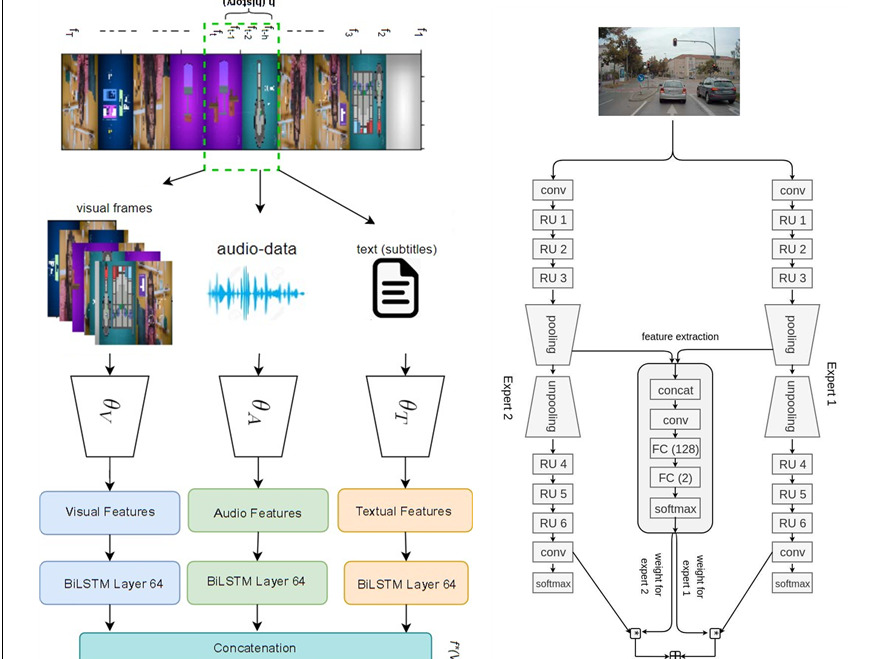Ph.D. candidate Sunjae Yoon (Prof. Chang D. Yoo) wins Best Paper Award
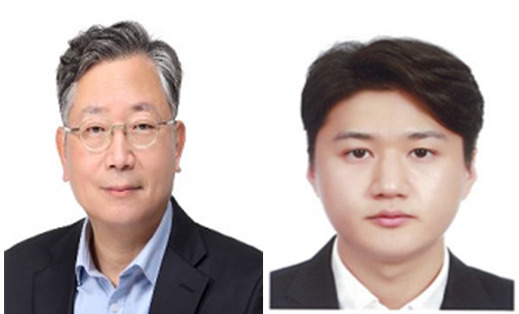
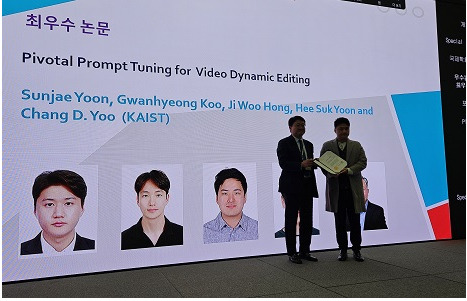

Ph.D. candidate Sunjae Yoon (Prof. Chang D. Yoo) wins Best Paper Award



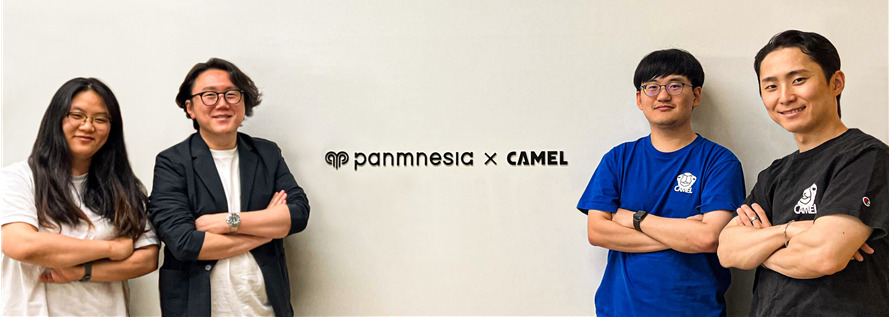
<ph.D Miryeong Kwon, Prof. Myoungsoo Jung, ph.D. candidate Donghyun Gouk and Hanyeoreum Bae>
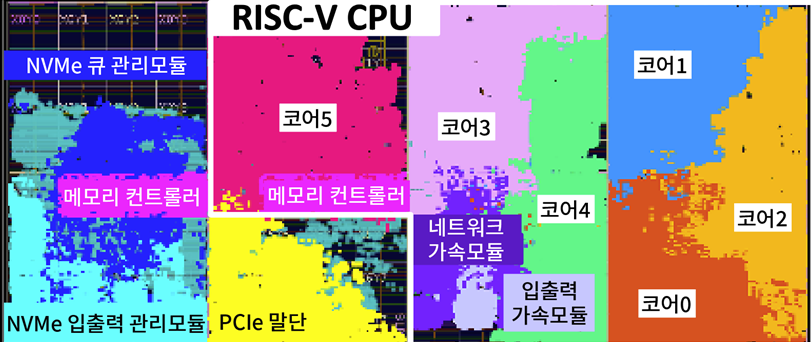

(picture 2 Docker SSD’s logotype)
The research was supported by Panmnesia(http://panmnesia.com) and Institute for Information and Communication Technology Promotion Planning and Evaluation(IITP).
This result has been reported by domestic media as followed.
[Link]
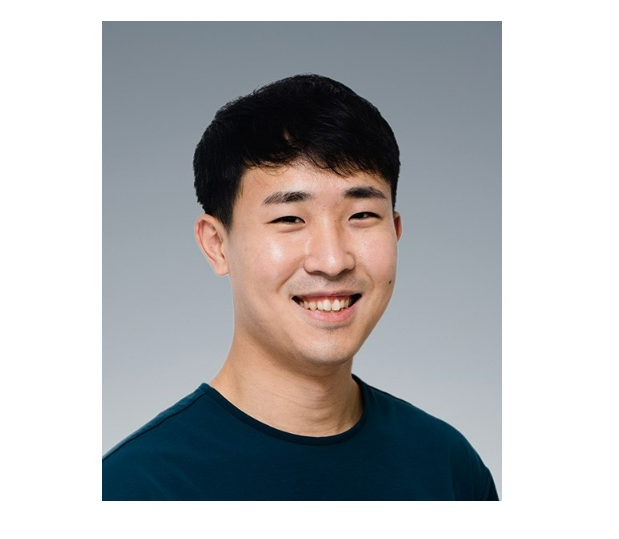
Han Seung-jae (Ph.D candidate from Professor Yoon Young-Gyu’s lab) receives the Trainee Professional Development Award and the AKN Outstanding Research Award at Neuroscience 2023
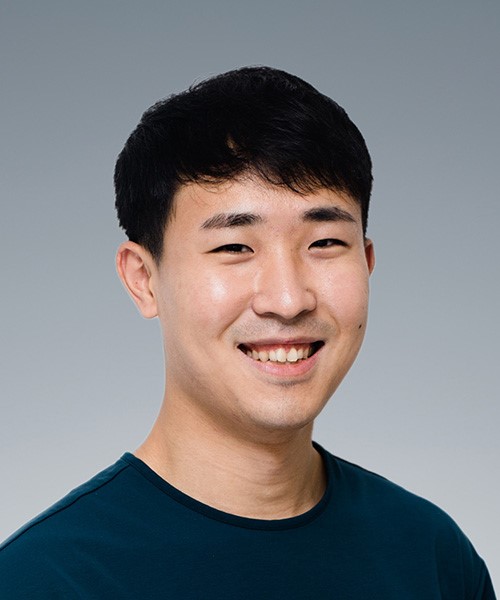
<Han Seung-jae ph.D candidate>
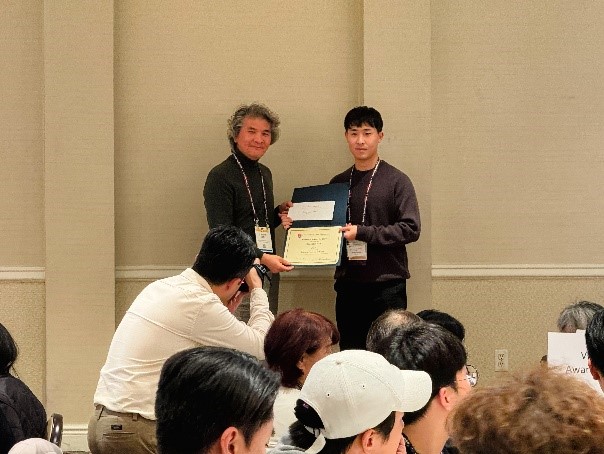
<Award Ceremony>
Ph.D candidate Han Seung-jae from professor Yoon Young-Gyu’s lab, received the Trainee Professional Development Award and the IBS/AKN Pre-doctoral Award at Neuroscience 2023.
Neuroscience 2023 is a conference organized by the Society for Neuroscience, held in Washington DC, USA, from November 11th to 15th, with approximately 30,000 official participants.
The Trainee Professional Development Award is given to students who have shown outstanding research achievements in the field of neuroscience. Recipients have the opportunity to present their research findings through a separate poster session and engage in networking with other students in the field.
Additionally, the recipients receive benefits such as a $2,500 scholarship, waived conference registration fees, and participation in workshops provided by institutions.
The 2023 AKN Outstanding Research Award is presented by the Association of Korean Neuroscientists based on comprehensive neuroscience research achievements.
The pre-doctoral award was given to a total of five doctoral candidates. A prize of $400 and a certificate are awarded to the recipients. Han Seung-jae received sponsorship from the Institute for Basic Science while writing his paper for the award.
At this conference, Han Seung-jae presented research that was selected as the cover article for the October 2023 issue of Nature Methods (Title: “Statistically unbiased prediction enables accurate denoising of voltage imaging data”).
This research proposes an effective method for removing noise from fluorescence microscopy images using machine learning and demonstrates its effectiveness in various experimental environments.
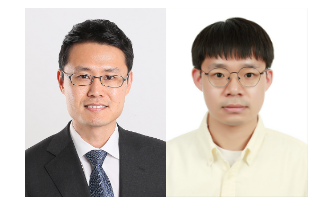
Professor Jaewoong Jung’s lab has been selected for 2023 National Research and Development TOP 100

[Professor Jaewoong Jeong, Ph.D candidate Choong-yeon Kim]
The wireless brain control system technology developed by Professor Jung Jae-woong’s laboratory at KAIST has been finally selected for the ‘2023 National Research and Development TOP 100’ by the Ministry of Science and ICT.
The National Research and Development TOP 100 is a policy that selects outstanding national research and development achievements across various ministries and agencies, marking its 18th year this year.
In the current year, a total of 854 candidate achievements recommended by each ministry underwent evaluation by a selection evaluation committee consisting of 100 experts from industry, academia, and research institutions. With this evaluation, the final 100 outstanding achievements are selected after public verification.
Particularly noteworthy is that Professor Jung Jae-woong’s research outcome was also chosen as one of the ‘Top 10 Achievements in Social Problem Solving’ through nationwide online voting.
As the world enters the era of aging, the number of patients suffering from brain diseases such as Parkinson’s is rapidly increasing.
However, the pace of progress in brain research to elucidate brain function and cure brain diseases has not kept up with the increasing rate of patients.
In response, Professor Jung Jae-woong’s research team combined wireless neural implant technology with IoT technology.
They successfully developed the world’s first IoT-based high-efficiency brain control system that can remotely select and control dozens to hundreds of brains with transplanted wireless neural implants simultaneously, anywhere in the world.
This technology not only supports fully automated, low-cost, high-efficiency brain research but also demonstrates the possibility of remote implementation for the efficient treatment of brain diseases such as Parkinson’s, dementia, and epilepsy.
Thus, it presents a new vision for brain research and the brain disease treatment.
Ph.D candidate Kim Chung-yeon, a KAIST undergraduate alumni, participated as co-first author in the introduced paper. It was published in the most prestigious international journal ‘Nature Biomedical Engineering’ on June 20, 2022 (Paper Title: Scalable and modular wireless-network infrastructure for large-scale behavioural neuroscience).
For more detailed information related to this news, you can check the link below.
https://m.dongascience.com/news.php?idx=62362
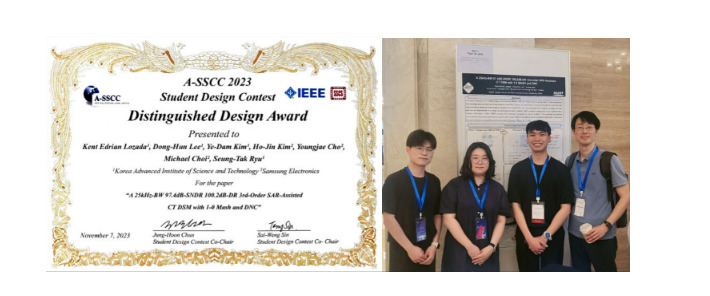
Ph.D. candidate Kent Edrian Lozada (Prof. Seung-Tak Ryu), received the Distinguished Design Award at 2023 IEEE A-SSCC


M.S. Course Jiwon Choi (Prof. Hoi-Jun Yoo), won the Best Design Award at 2023 IEEE A-SSCC
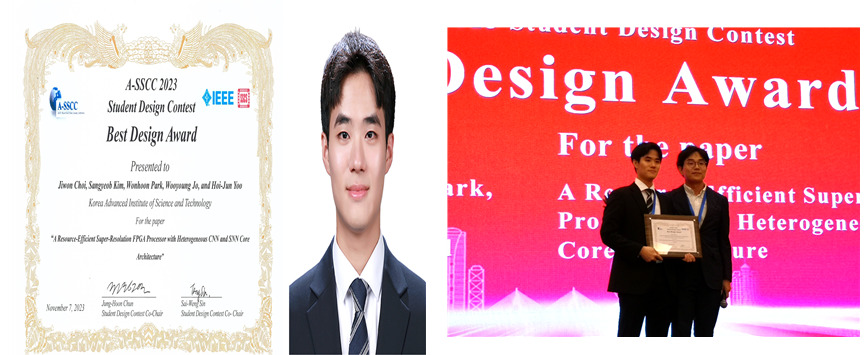
M.S. student Jiwon Choi (Advised by Hoi-Jun Yoo) won the Best Design Award at the 2023 IEEE Asian Solid-State Circuits Conference (A-SSCC) Student Design Contest.
The conference was held in Hainan, China from November 5th to 8th. A-SSCC is an international conference held annually by IEEE. M.S. student Jiwon Choi has published a paper titled “A Resource-Efficient Super-Resolution FPGA Processor with Heterogeneous CNN and SNN Core Architecture”.
Details are as follows.
Conference: 2023 IEEE Asian Solid-State Circuits Conference (A-SSCC)
Date: November 5-8, 2023
Award: Best Design Award
Authors: Jiwon Choi, Sangyeob Kim, Wonhoon Park, Wooyoung Jo, and Hoi-Jun Yoo (Advisory Professor)
Paper Title: A Resource-Efficient Super-Resolution FPGA Processor with Heterogeneous CNN and SNN Core Architecture
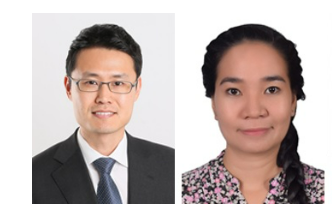
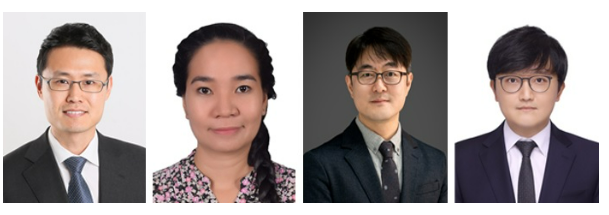
The structure and dexterity of rigid medical IV devices also enable unethical reuse of needles for reduction of injection costs, leading to transmission of deadly blood-borne disease infections such as human immunodeficiency virus (HIV) and hepatitis B/C viruses.
Furthermore, unintended needlestick injuries are frequently occurring in medical settings worldwide, that are viable sources of such infections, with IV needles having the greatest susceptibility of being the medium of transmissible diseases.
For these reasons, the World Health Organization (WHO) in 2015 launched a policy on safe injection practices to encourage the development and use of “smart” syringes that have features to prevent re-use, after a tremendous increase in the number of deadly infectious disease worldwide due to medical-sharps related issues.
KAIST announced on the 13th that Professor Jae-Woong Jeong and his research team of its School of Electrical Engineering succeeded in developing the Phase-Convertible, Adapting and non-REusable (P-CARE) needle with variable stiffness that can improve patient health and ensure the safety of medical staff through convergent joint research with another team led by Professor Won-Il Jeong of the Graduate School of Medical Sciences.
The new technology is expected to allow patients to move without worrying about pain at the injection site as it reduces the risk of damage to the wall of the blood vessel as patients receive IV medication.
This is possible with the needle’s stiffness-tunable characteristics which will make it soft and flexible upon insertion into the body due to increased temperature, adapting to the movement of thin-walled vein.
It is also expected to prevent blood-borne disease infections caused by accidental needlestick injuries or unethical re-using of syringes as the deformed needle remains perpetually soft even after it is retracted from the injection site.
The results of this research, in which Karen-Christian Agno, a doctoral researcher of the School of Electrical Engineering at and Dr. Keungmo Yang of the Graduate School of Medical Sciences participated as co-first authors, was published in Nature Biomedical Engineering on October 30. (Paper title: A temperature-responsive intravenous needle that irreversibly softens on insertion)
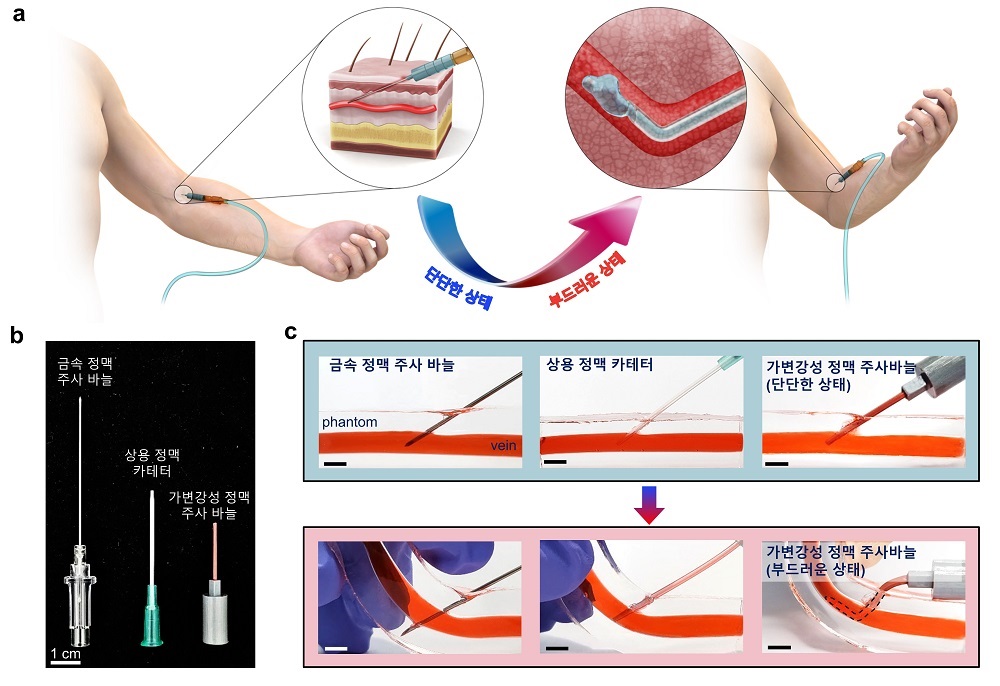
< Figure 1. Disposable variable stiffness intravenous needle. (a) Conceptual illustration of the key features of the P-CARE needle whose mechanical properties can be changed by body temperature, (b) Photograph of commonly used IV access devices and the P-CARE needle, (c) Performance of common IV access devices and the P-CARE needle >
“We’ve developed this special needle using advanced materials and micro/nano engineering techniques, and it can solve many global problems related to conventional medical needles used in healthcare worldwide”, said Jae-Woong Jeong, Ph.D., an associate professor of Electrical Engineering at KAIST and a lead senior author of the study.
The softening IV needle created by the research team is made up of liquid metal gallium that forms the hollow, mechanical needle frame encapsulated within an ultra-soft silicone material. In its solid state, gallium has sufficient hardness that enables puncturing of soft biological tissues.
However, gallium melts when it is exposed to body temperature upon insertion, and changes it into a soft state like the surrounding tissue, enabling stable delivery of the drug without damaging blood vessels. Once used, a needle remains soft even at room temperature due to the supercooling phenomenon of gallium, fundamentally preventing needlestick accidents and reuse problems.
Biocompatibility of the softening IV needle was validated through in vivo studies in mice. The studies showed that implanted needles caused significantly less inflammation relative to the standard IV access devices of similar size made of metal needles or plastic catheters. The study also confirmed the new needle was able to deliver medications as reliably as commercial injection needles.
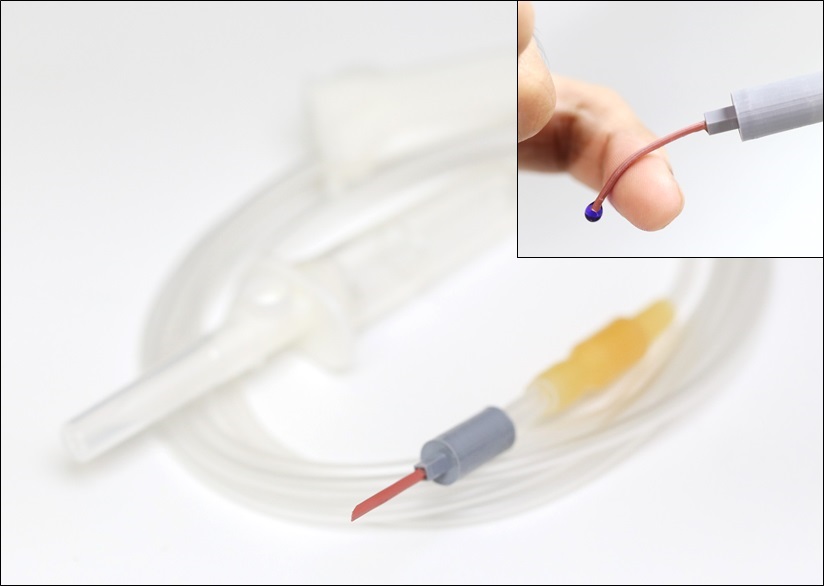
< Photo 1. Photo of the P-CARE needle that softens with body temperature. >
Researchers also showed possibility of integrating a customized ultra-thin temperature sensor with the softening IV needle to measure the on-site temperature which can further enhance patient’s well-being.
The single assembly of sensor-needle device can be used to monitor the core body temperature, or even detect if there is a fluid leakage on-site during indwelling use, eliminating the need for additional medical tools or procedures to provide the patients with better health care services.
The researchers believe that this transformative IV needle can open new opportunities for wide range of applications particularly in clinical setups, in terms of redesigning other medical needles and sharp medical tools to reduce muscle tissue injury during indwelling use.
The softening IV needle may become even more valuable in the present times as there is an estimated 16 billion medical injections administered annually in a global scale, yet not all needles are disposed of properly, based on a 2018 WHO report.
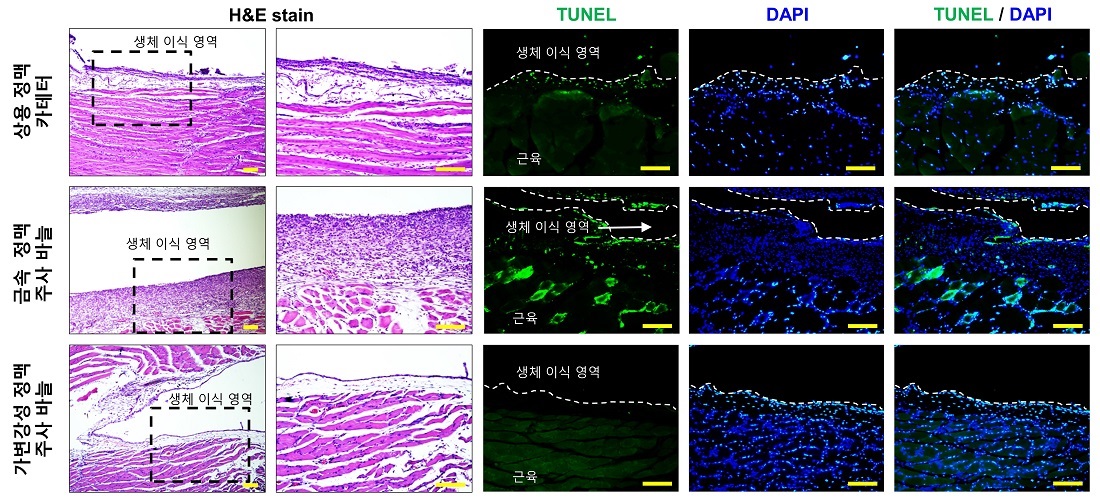
< Figure 2. Biocompatibility test for P-CARE needle: Images of H&E stained histology (the area inside the dashed box on the left is provided in an expanded view in the right), TUNEL staining (green), DAPI staining of nuclei (blue) and co-staining (TUNEL and DAPI) of muscle tissue from different organs. >

< Figure 3. Conceptual images of potential utilization for temperature monitoring function of P-CARE needle integrated with a temperature sensor. >
(a) Schematic diagram of injecting a drug through intravenous injection into the abdomen of a laboratory mouse (b) Change of body temperature upon injection of drug (c) Conceptual illustration of normal intravenous drug injection (top) and fluid leakage (bottom) (d) Comparison of body temperature during normal drug injection and fluid leakage: when the fluid leak occur due to incorrect insertion, a sudden drop of temperature is detected.
This work was supported by grants from the National Research Foundation of Korea (NRF) funded by the Ministry of Science and ICT.
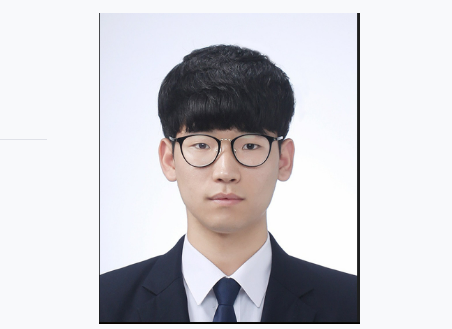
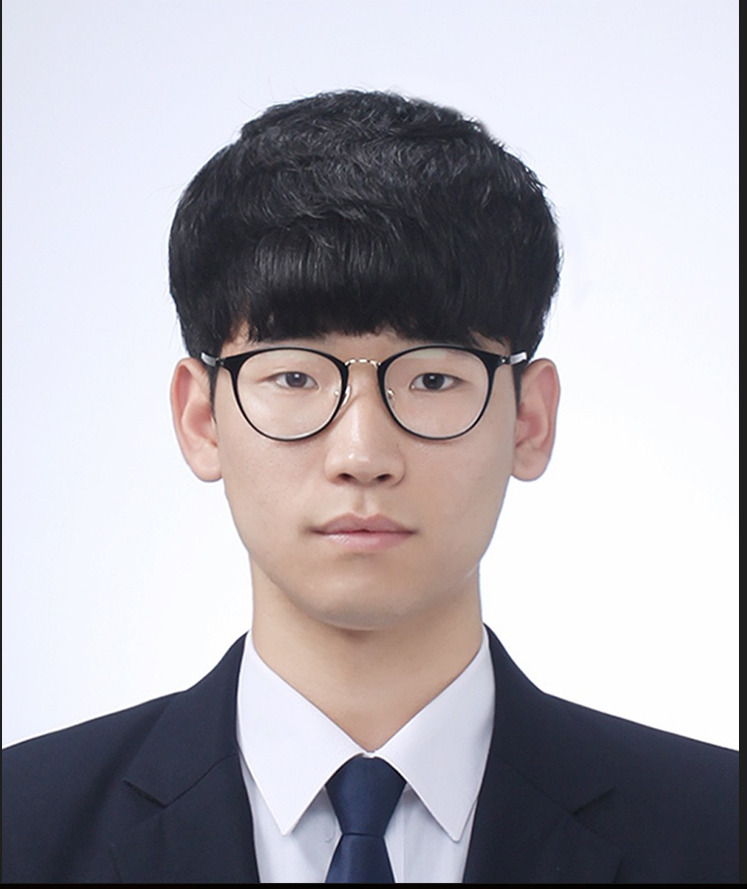
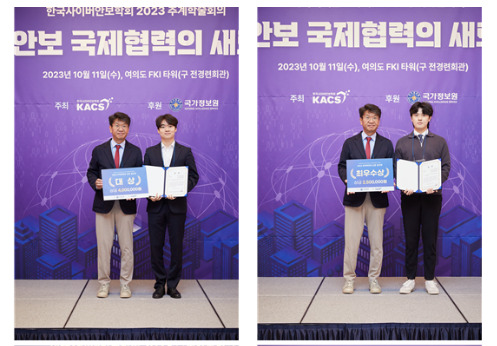
Professor Seungwon Shin’s NSS Lab Wins a Total of 7 Awards in the 2023 Cybersecurity Paper Competition Sponsored by the National Intelligence Service
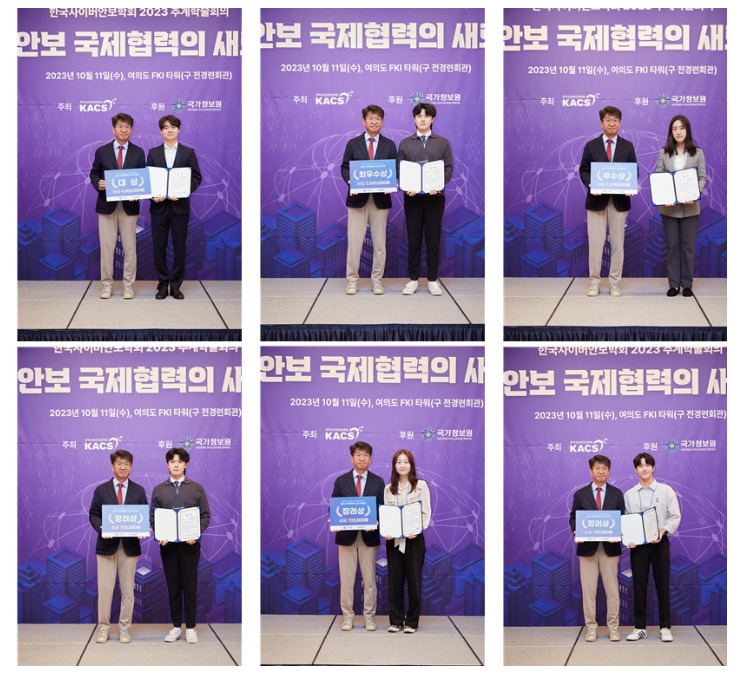
The research team (NSS lab) led by Professor Seungwon Shin from KAIST’s Department of Electrical and Electronic Engineering has received a total of 7 awards in the 2023 Cybersecurity Paper Competition, including the top prize in the technology.
Starting in 2017, the competition is organized by National Intelligence Service to foster cybersecurity expertise and enhance research capabilities in cybersecurity.
Exceptional papers presented in previous editions of this competition have made significant contributions to national cybersecurity technology development, policy formulation, and strategy.
Professor Seungwon Shin’s research team, including Ph.D. candidate Myeongseong Yoo from KAIST and Professor Jaehyun Nam from Dankook University, received the best paper award in technology section along with cash reward of 4 million KRW for their paper titled “HELIOS: Hardware-assisted High-performance Security Extension for Cloud,” which focuses on a hardware-based network security system for a secure cloud environment.
Furthermore, a team consisting of Ph.D. candidates Jaehan Kim, Minkyu Song, and Youngjin Jin from Professor Shin’s lab received the outstanding paper award in the technology section for their work on “Graph-based Deep Learning Framework for Credential Stuffing Risk Prediction,” a framework that uses graph neural networks to proactively predict the risk of credential stuffing attacks between websites by modeling the reused password relationship.
In addition, students Suhyun Kim, Hanna Kim, Seungho Na, and Somin Cho from Professor Shin’s research lab received one award and four honorable mentions in the technology section.
Myeongseong Yoo, a top prized student, mentioned that “The system we developed utilizes smartNIC to accelerate communication between virtual machines and containers. It not only provides better security than traditional software-based security systems but also is expected to be highly useful in creating a safe cloud environment.”
The complete list of awards received by Professor Seungwon Shin’s research team in the 2023 Cybersecurity Paper Competition is as follows:
*Best Paper Award in Technology: Myeongseong Yoo (Ph.D. candidate) and Professor Jaehyun Nam (Dankook University)
*Outstanding Paper Award in Technology Category: Jaehan Kim, Minkyu Song, and Youngjin Jin (Ph.D. candidates)
*Paper Award in Technology Category: Suhyun Kim and Seungho Na (Ph.D. candidates)
*Honorable Mentions in Technology Category (4 awards):
-Hanna Kim (Ph.D. candidate) and Geon Choi (Student, Indiana University Bloomington)
-Jaehan Kim and Minkyu Song (Ph.D. candidates)
-Seungho Na and Somin Cho (Ph.D. candidates)
-Minkyu Song and Jaehan Kim (Ph.D. candidates)

CAMEL research team has been successively selected for 2023 Samsung Future Technology Development Program

The CAMEL research team from our department, led by Professor Myoungsoo Jung, has been chosen to participate in the Samsung Future Technology Development Program.
This recognition comes with support for their study titled, “Software-Hardware Co-Design for Dynamic Acceleration in Sparsity-aware Hyperscale AI.”
Large AI models, such as mixture of experts (MoE), autoencoders, and multimodal learning, grouped under the umbrella of Hyperscale AI, have gained traction due to the success of expansive model-driven applications, including ChatGPT.
Based on the insight that computational traits of these models often shift during training, the research team has suggested acceleration strategies.
These encompass software technologies, unique algorithms, and hardware accelerator layouts.
A key discovery by the team was the inability of existing training systems to account for variations in data sparsity and computational dynamics between model layers. This oversight obstructs adaptive acceleration.
To address this, the CAMEL team introduced a dynamic acceleration method that can detect shifts in computational traits and adapt computation techniques in real-time.
The findings from this research could benefit not only Hyperscale AI but also the larger domain of deep learning and the burgeoning services sector.
The team’s goals include producing tangible hardware models and offering open-source software platforms.
Samsung Electronics, since 2013, has initiated the ‘Future Technology Development Program’, investing KRW 1.5 trillion to stimulate technological innovation pivotal for future societal progress.
For a decade, they have backed initiatives in foundational science, innovative materials, and ICT, particularly favoring ventures that are high-risk but offer significant returns.
The CAMEL team has been collaborating with Samsung since 2021 on a project focusing on accelerating Graph Neural Networks (GNNs). We extend our hearty congratulations to them as they embark on this fresh exploration into the realm of Hyperscale AI.
